June 30, 2025 | 16:12 GMT +7
June 30, 2025 | 16:12 GMT +7
Hotline: 0913.378.918
June 30, 2025 | 16:12 GMT +7
Hotline: 0913.378.918
On the morning of June 28, the National Conference on the "Journey to Net Zero" began with the theme of "Technical Support and Access to Green Finance". Hundreds of experts, businesses, and organizations, both domestic and international, convened for an open dialogue on one of the most significant challenges of the 21st century: climate change.
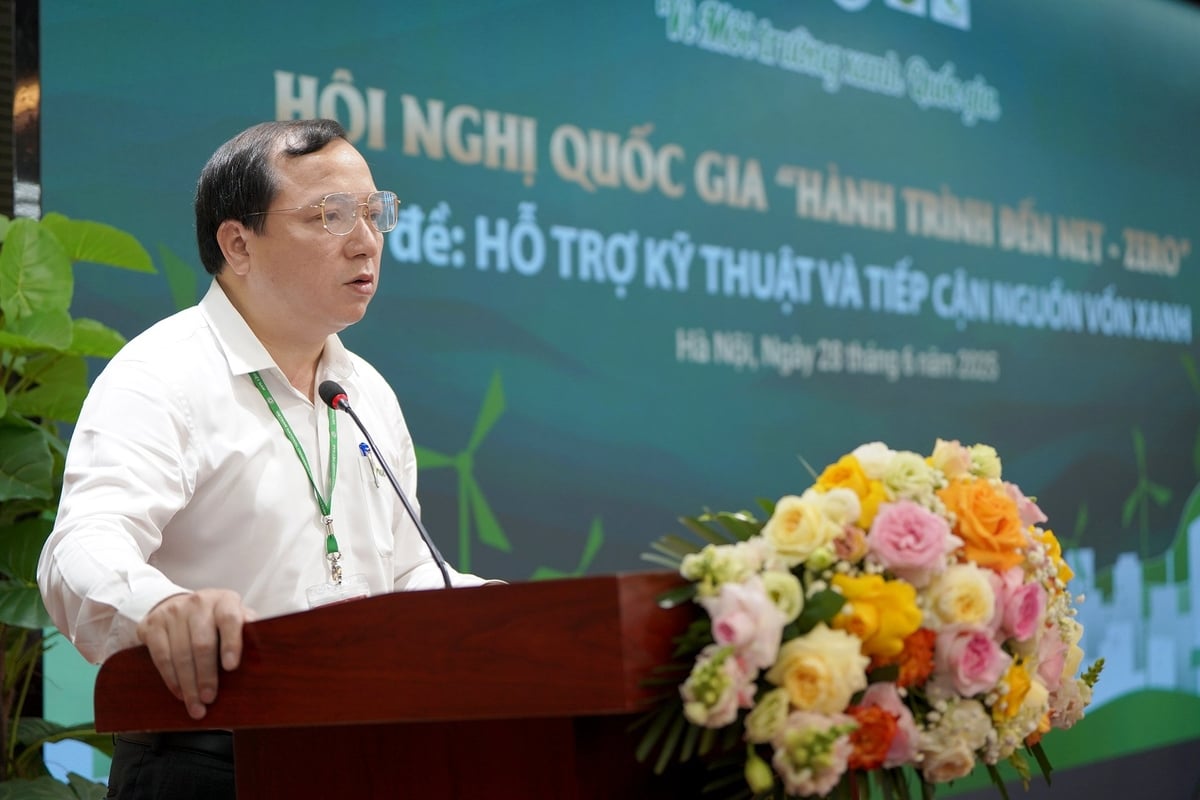
Associate Professor, Dr. Vu Ngoc Huyen delivered the opening speech at the conference. Photo: Bao Thang.
In his inaugural address, Vice Chairman of the Council at the Vietnam Academy of Agriculture, Assoc. Prof. Dr. Vu Ngoc Huyen, declared that Net Zero is no longer an option; it is a mission that is universally accessible and that permits no postponement.
He referred to the "journey" not as a metaphor, but as a precise representation of a challenging process that necessitates a change in development mindset, the integration of new technologies, and, most importantly, the unification of society, encompassing policy frameworks, businesses, and individual citizens.
The conference established three fundamental objectives: to establish an open forum for the exchange of innovative solutions, to promote synergy among critical stakeholders, and to motivate action by converting commitments into tangible outcomes rather than allowing them to remain as abstract phrases.
"I strongly encourage all attendees to extend their networks, challenge ideas, and ask questions", Dr. Huyen underscored that each conversation today could serve as a pivotal moment in the future.
Dr. Nguyen Sy Linh, a representative of the Institute of Agricultural and Environmental Policy and Strategy, provided an overview of Vietnam's greenhouse gas emissions during the expert session. Over the course of 14 years, the national emissions have increased by 2.5 times, with energy being the primary contributor. Despite the fact that agriculture's proportion has declined, it remains the second most significant sector, trailing only manufacturing and waste.
"Emissions will continue to rise toward 2030 if we don't take action now", Dr. Linh cautioned. Adaptation alone is no longer sufficient; we must commence the reduction of emissions immediately.
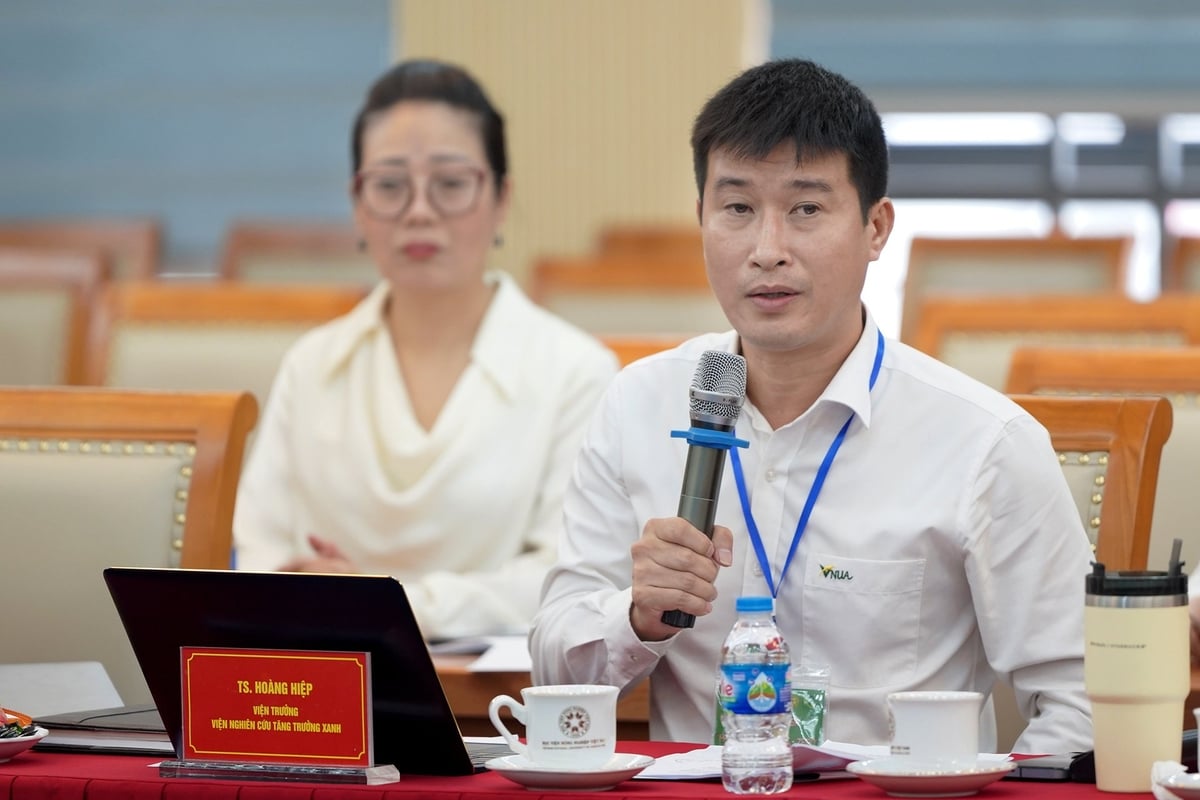
Dr. Hoang Hiep, Director of the Green Growth Research Institute: The greatest value of the conference is the spirit of cooperation between the parties. Photo: Bao Thang.
The Vietnamese government has already foreseen this trend by issuing strategic frameworks such as the National Climate Change Strategy to 2050, the updated 2022 Nationally Determined Contributions (NDC), and the legal foundation for a carbon market under the 2020 Law on Environmental Protection and Decree 06/2022.
Decree 119/2025/ND-CP, which was most recently issued, established the foundation for Vietnam's domestic carbon market by specifying emission quota allocations for critical sectors, including thermal power, cement, and steel. Additionally, the decree broadened the scope of emissions inventory coverage to include more than 2,100 facilities, which collectively account for approximately 30% of national emissions.
Dr. Linh posits that this is not merely a technical modification; rather, it signifies a "substantial transformation in development philosophy, from the pursuit of growth at all costs to responsible, sustainable growth".
Businesses serve as the primary intermediary in this transformation. They are not only significant emitters, but they also control the financial, technological, and operational levers of production. "Businesses are unable to remain inactive", Dr. Linh observed and stated that they are responsible for measuring emissions and adhering to quotas. If executed correctly, they have the potential to sell carbon credits as a new asset.
Vietnamese enterprises are at a juncture: either they must proactively adapt or be excluded from global supply chains in response to the increasing pressure from markets such as the EU, US, and Japan, where every unit of emission is monitored and traced.
This context renders the carbon market a versatile instrument that not only facilitates cost optimization but also generates new revenue sources. Enterprises that exceed their emission quotas but lack the resources to invest may purchase credits, while those that effectively reduce emissions may sell surplus credits.
In particular, "green" enterprises will have an advantage in obtaining preferential financing, including the Green Climate Fund (GCF), the Just Energy Transition Partnership (JETP), or domestic green credit channels. These components collectively establish a novel ecosystem in which "benefit" and "responsibility" are inextricably involved.
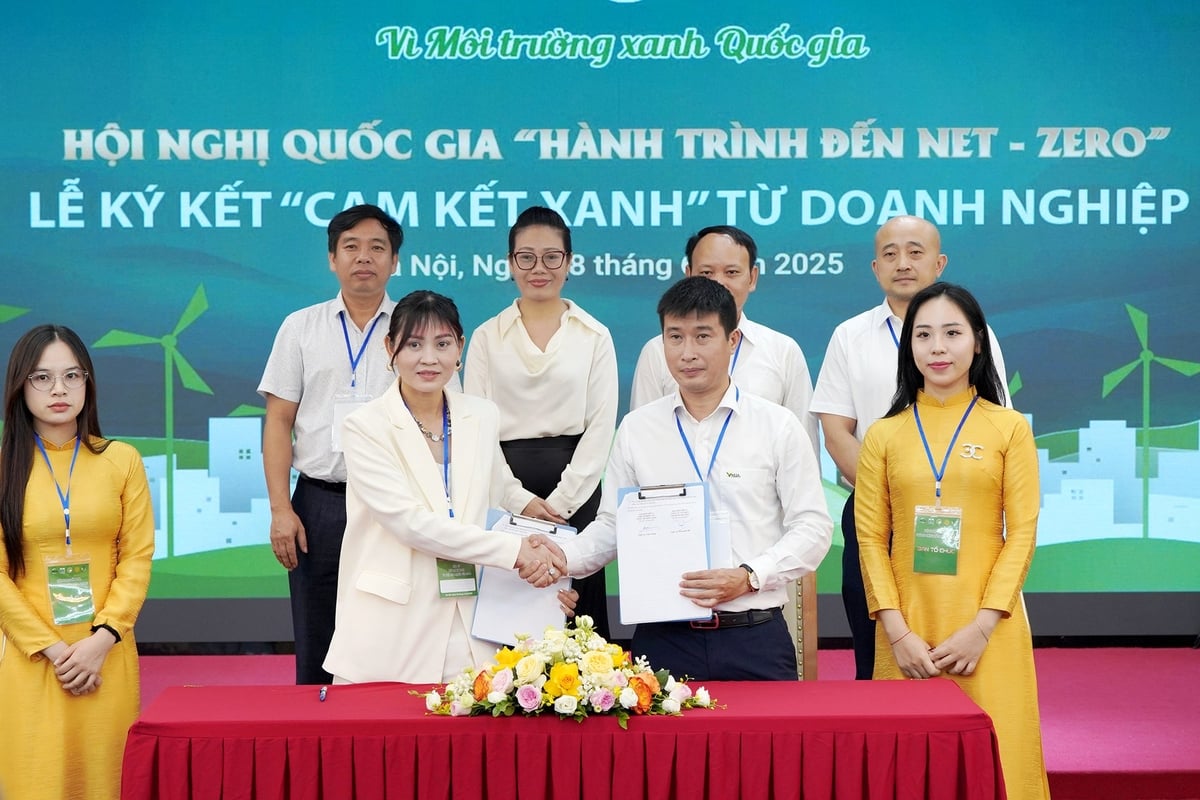
Green Growth Research Institute signed a cooperation agreement with Vinasamex. Photo: Bao Thang.
In addition to enterprises, the conference on June 28 brought together a diverse array of individuals, including international organizations, agricultural cooperatives, industry associations, and research institutes and tech firms. A practical, solutions-based perspective was taken to investigate critical topics, including renewable energy, low-carbon agriculture, circular economy models, and carbon capture technologies.
The ambiance was reminiscent of an academic forum, where the participants debated the connections between research, policy, and market requirements by examining technical support models, green credit schemes, and innovative solutions.
It is important to mention that a number of significant corporations and agri-businesses reported on their own emission-reduction journeys, which suggests an internal transformation within the economy. These organizations have prioritized intrinsic motivation by actively participating in the Net Zero race, rather than anticipating policy adjustments.
According to Dr. Hoang Hiep, Director of the Green Growth Research Institute and Head of the "For a National Green Environment" program, the conference's greatest value was not in any single lecture but in the unparalleled spirit of collaboration. "This event is a fusion of aspiration, commitment, and intellect for a sustainable Vietnam," he stated.
He encouraged stakeholders to continue the conference's spirit: "Convert commitments into measurable outcomes, and ideas into projects." The organizing committee's responsibilities do not conclude with the June 28 event; they also include establishing connections between policymakers, investors, and businesses to secure the necessary technical and financial resources to implement Net Zero initiatives.
In breakout groups, businesses, experts, and organizations continued to engage in lively discussions as they devised practical strategies to achieve Net Zero. A significant result was a cooperation agreement between the Green Growth Research Institute, Mai Hoa Group JSC, and Vietnam Cinnamon Star Anise Production & Export JSC.
These stages establish the foundation for a sustainable, resilient ecosystem, despite the fact that they are not immediate breakthroughs. Emission reduction is no longer just a lofty policy slogan; it is evolving into a practical voyage in which every initiative and connection made today lays the groundwork for a greener future in Vietnam.
Translated by Linh Linh
/2025/06/30/0115-3-125736_6.jpg)
(VAN) This is the wish of local governments and pig farmers to establish comprehensive herd immunity, enhance the effectiveness of African Swine Fever (ASF) control, and reduce economic losses.
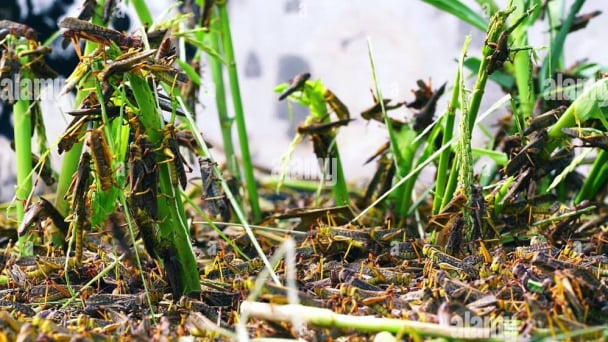
(VAN) A group of Chinese researchers has discovered the biosynthesis and release process of the key pheromone that causes a locust outbreak, making an important contribution to the ecological prevention of locust plagues.
/2025/06/27/4654-2-213900_52.jpg)
(VAN) The Central Annamites Landscape Strategy for the 2025–2030 period sets a comprehensive direction for forest conservation, ecosystem restoration, and sustainable livelihood development.
![Lifting the IUU 'yellow card': [2] Thorough preparation for the EC inspection](https://t.ex-cdn.com/nongnghiepmoitruong.vn/608w/files/huytd/2025/06/27/3109-1-005033_548.jpg)
(VAN) Ahead of the fifth inspection by the EC, Khanh Hoa and Phu Yen have controlled fishing vessels, catch volumes at ports, and VMS equipment to meet the requirements for lifting the IUU 'yellow card.'
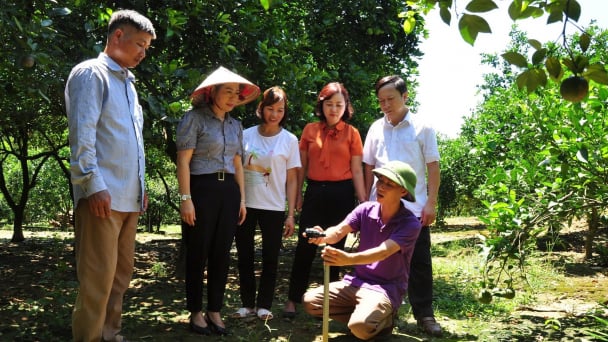
(VAN) Since the implementation of Resolution No. 03 by the People's Council of Tuyen Quang province, 282 organizations and individuals have been supported with advanced, water-saving irrigation systems, covering a total area of 765 hectares.
![Lifting the IUU 'yellow card': [1] Fisherpeople join forces](https://t.ex-cdn.com/nongnghiepmoitruong.vn/608w/files/huyenvt (e)/2025/06/26/0551-4-205700_585.jpg)
(VAN) To lift the EC's 'yellow card,' fisherpeople have significantly raised their awareness in complying with legal regulations in marine fishing activities.